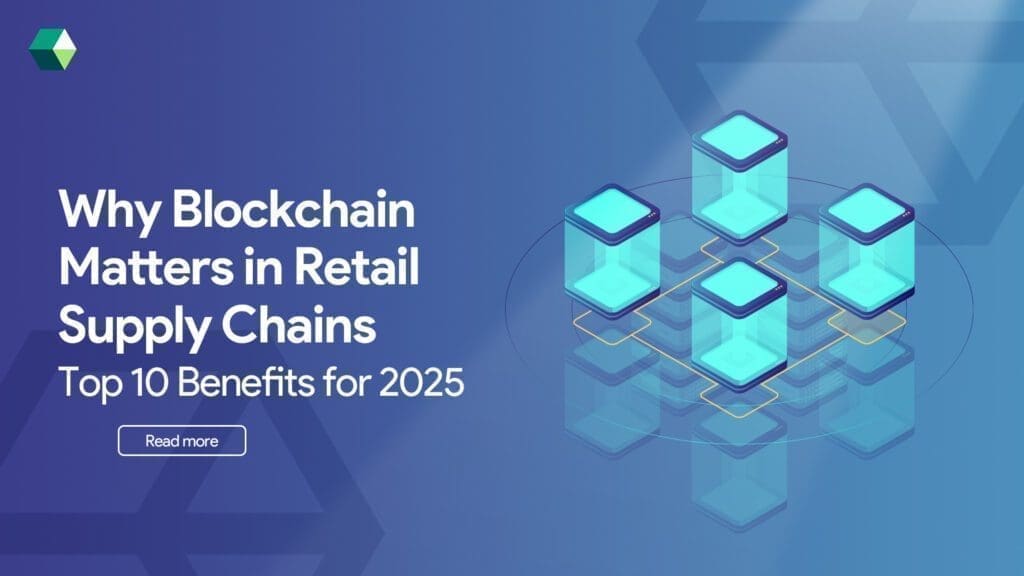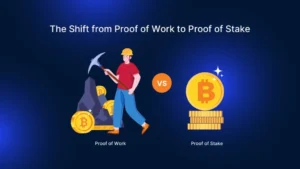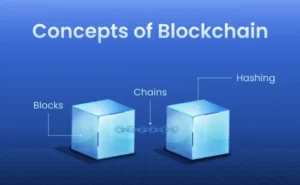
Retail supply chains have always been the backbone of global commerce. They move products from manufacturers to customers, handle large volumes of data, and manage relationships among suppliers, warehouses, and logistics. But traditional systems often suffer from delays, miscommunication, fraud, and a lack of transparency. Now, blockchain technology is changing all of that.
In this blog, we’ll explore how blockchain is revolutionizing the retail supply chain industry in 2025, the benefits it offers, real-world use cases, and why it’s becoming an essential tool for businesses aiming to stay competitive and efficient.
Understanding Blockchain in Retail Supply Chains
A blockchain is a decentralized digital ledger that records transactions in a secure, transparent, and tamper-proof way. Every participant in the blockchain network has access to a single source of truth. Once data is entered, it cannot be altered or deleted, ensuring reliability and trust.
In retail supply chains, blockchain creates a seamless and secure flow of information between various stakeholders — suppliers, manufacturers, warehouse operators, transporters, retailers, and even customers. Every product can be tracked from its origin to the point of sale using a permanent and accessible digital record. This visibility is invaluable, especially in 2025 when consumers, regulators, and partners all expect verifiable information about a product’s origin, quality, and compliance.
Top Benefits of Blockchain in Retail Supply Chains (2025)
-
Unmatched Transparency Across the Supply Chain
One of the most powerful benefits of blockchain in retail supply chains is the ability to offer unmatched transparency. In traditional models, information is fragmented across different systems, making it difficult to get a complete view of the product’s journey. Retailers often rely on outdated records, manual updates, and third-party intermediaries to understand what’s happening.
With blockchain, every step — from production and shipping to storage and delivery — is automatically recorded on a decentralized ledger that is visible to all authorized participants. Aligned shipping strategies can then use this transparency to optimize routes and improve overall efficiency. Consumers can now scan a product’s QR code and instantly see where it came from, how it was handled, what materials were used, and even who packed it. This transparency boosts consumer trust and empowers ethical consumption.
-
Complete Traceability and Product Origin Tracking
Today’s consumers are more informed than ever. In 2025, they demand to know exactly where their products come from — whether it’s organic fruits, cruelty-free cosmetics, or ethically sourced clothing. Brands that can’t prove their supply chain practices lose credibility and customer loyalty. Blockchain enables full traceability by recording a digital footprint of every action taken on a product — from farm to factory to shelf. This creates a tamper-proof record of provenance that can be used for compliance, audits, and consumer verification.
For example, a fashion retailer can use blockchain to show that the cotton in a T-shirt was grown without pesticides, processed using sustainable methods, and manufactured under fair labor conditions. This level of traceability ensures authenticity, supports sustainability claims, and gives retailers a competitive edge.
-
Accelerated and Accurate Product Recalls
Product recalls are one of the most stressful events in retail. Whether it’s contaminated food, faulty electronics, or mislabeled pharmaceuticals, recalls are expensive, time-consuming, and can severely damage a brand’s reputation.
Blockchain dramatically improves recall efficiency. With real-time tracking and immutable records, retailers can identify the exact batch, shipment, or even individual product that needs to be recalled. This precision allows them to avoid blanket recalls and reduce waste, cost, and customer dissatisfaction. Instead of weeks of investigation, a blockchain-powered recall can be executed in hours — minimizing harm and maintaining trust.
-
Real-Time Inventory and Supply Chain Visibility
Inventory management has always been a balancing act. Overstocking leads to higher storage costs and potential spoilage, while understocking results in lost sales and dissatisfied customers. Maintaining proper inventory valuation is also essential to ensure accurate financial reporting and avoid discrepancies that can disrupt decision-making. In 2025, supply chains must be agile and responsive.
Blockchain offers real-time visibility into inventory levels, shipment statuses, and warehousing data. By integrating blockchain with IoT sensors, retailers gain live updates on stock movement, temperature control, location tracking, and more. This level of visibility helps retailers optimize reordering processes, reduce inventory shrinkage, manage seasonal demand, and improve shelf availability. It also allows for predictive analytics, enabling smarter planning based on historical and real-time data.
-
Fraud Prevention and Counterfeit Protection
Counterfeit products continue to plague the retail industry, particularly in luxury goods, electronics, and pharmaceuticals. In 2025, the need for robust anti-fraud measures is more critical than ever. Blockchain helps retailers fight fraud by creating a secure digital record of every product’s life cycle. Each product can have a unique blockchain identity that proves its origin and authenticity. This record cannot be manipulated, making it impossible for counterfeit goods to be inserted into the blockchain supply chain unnoticed.
Customers can verify the authenticity of their purchases by scanning a code and checking the blockchain ledger. This builds confidence and deters fraudsters, protecting both consumers and brands.
-
Greater Trust and Long-Term Customer Loyalty
Trust is a key currency in retail — and in 2025, it’s becoming a decisive factor in where consumers choose to shop. Blockchain builds trust by offering verifiable, tamper-proof data about products, business practices, and ethical sourcing.
When customers can see proof of sustainability, fair labor, or organic certification, they are more likely to trust the brand. This trust translates into higher customer retention and long-term loyalty. Additionally, loyalty programs can be securely managed on blockchain, allowing customers to collect and redeem rewards across multiple platforms without the risk of manipulation or loss.
-
Streamlined Collaboration Between Stakeholders
Supply chains involve numerous players — suppliers, logistics providers, manufacturers, customs agents, warehouse operators, and retailers — each with their own systems and priorities. Communication gaps and data inconsistencies often lead to delays, errors, and inefficiencies.
Blockchain creates a shared digital environment where all parties can view and update relevant data in real time. This fosters better coordination, faster decision-making, and improved conflict resolution. This fosters better coordination, faster decision-making, and improved conflict resolution. Combined with AI-powered sales and operational intelligence platforms like Sales Echo, retailers can take this a step further — using predictive analytics, sales trend forecasting, and automated alerts to align inventory, logistics, and sales strategies in real time. By bridging blockchain’s secure data with AI-driven insights, businesses can optimize stock levels, reduce missed sales opportunities, and improve overall profitability. Smart contracts — self-executing agreements coded on the blockchain — automate workflows such as payment releases, compliance checks, or goods acceptance, reducing the need for manual oversight and third-party mediation.
-
Easier Compliance with Regulations and Standards
Governments around the world are tightening regulations around safety, sustainability, and labor practices in retail. Keeping up with these rules — and proving compliance — can be complex and expensive.
Blockchain simplifies regulatory compliance by providing a secure, timestamped record of all relevant documentation, inspections, and certifications. Regulatory agencies can be given controlled access to blockchain records for transparent and efficient auditing. Retailers can automate compliance checks through smart contracts, reducing human error and speeding up reporting processes. This is particularly valuable in industries like food, cosmetics, and pharmaceuticals where traceability is legally required.
-
Reduced Costs Through Automation and Error Minimization
Every inefficiency in the supply chain — lost goods, paperwork errors, delays, duplicate processes — adds to operational costs. Blockchain helps eliminate these inefficiencies by creating an automated and error-resistant workflow.
Processes like invoicing, customs clearance, and payment processing can be handled through smart contracts, reducing the need for manual data entry, verification, and intervention. By streamlining documentation, reducing fraud, and improving logistics coordination, blockchain significantly lowers operational costs while increasing profitability.
-
A Powerful Enabler of Sustainability and ESG Reporting
Sustainability isn’t just a trend — it’s a requirement in 2025. Customers, investors, and regulators expect retail businesses to prove their commitment to environmental and social responsibility. Blockchain helps retailers meet sustainability goals by providing transparent tracking of carbon emissions, raw material sourcing, packaging practices, and labor conditions. These data points can be verified, audited, and shared through dashboards or reports.
With blockchain, retailers can confidently make claims such as “100% recycled material” or “carbon-neutral shipping” — and back them up with irrefutable data. This also simplifies ESG (Environmental, Social, and Governance) reporting for stakeholders and improves access to green financing or certifications.
Real-Life Examples of Blockchain in Retail Supply Chains (2025)
Several leading retail players have already begun integrating blockchain in their supply chain ecosystems. Here are a few scenarios that showcase its impact:
-
Grocery Retailers
A leading supermarket uses blockchain to track perishable goods from farms to stores, monitoring freshness, storage temperature, and transport timelines. This ensures food safety and allows quick, targeted recalls when necessary.
-
Pharmaceutical Retail
Drug retailers use blockchain to ensure that medicines are not tampered with and are stored under proper conditions. This protects patients and ensures regulatory compliance.
-
Luxury Fashion Brands
High-end fashion brands use blockchain to authenticate products and prove ethical sourcing — helping to fight counterfeits and support conscious consumerism.
-
Electronics Retailers
Blockchain tracks product components and their sources, ensuring quality control and simplifying warranty management by storing records on-chain.
The Road Ahead: What’s Next for Blockchain in Retail Supply Chains?
The future of retail supply chains is digital, transparent, and intelligent. Blockchain will play a pivotal role in:
- AI-powered predictive logistics
- Digital twin technologies
- Integration with 5G and IoT for real-time decision-making
- Tokenized reward systems for customers and partners
- Decentralized marketplaces for suppliers
As we move forward, blockchain will no longer be a “nice-to-have” but a critical infrastructure for any retailer aiming to stay competitive, responsible, and consumer-focused.
Simplify Your Supply Chain with Blockchain – Join Us!
Blockchain is more than just a buzzword—it’s a practical tool that’s making retail supply chains smarter, faster, and more transparent. From improving traceability to eliminating fraud and enhancing the customer experience, blockchain offers real value to retailers who want to thrive in 2025’s digital economy. Whether you’re a small business or a large enterprise, embracing this technology could be a game-changer.
By adopting Supply Chain Blockchain strategies and investing in reliable Blockchain Supply Chain Solutions, businesses are reshaping how goods move and how trust is built. A skilled Supply Chain Development Company can help implement these solutions effectively. These services go beyond traditional Supply Chain Development and focus on future-proof Supply Chain Solutions that are built for transparency, automation, and resilience.
Ready to Embrace Blockchain in Your Retail Supply Chain?
Looking to upgrade your retail supply chain with the power of blockchain? Whether you’re just starting or ready to scale, working with a skilled blockchain development company can help you design and implement the right solution tailored to your goals.
From product tracking and smart contracts to sustainability dashboards and digital verification tools, you can unlock the full potential of blockchain technology and lead the retail industry into a new era of innovation and transparency.






